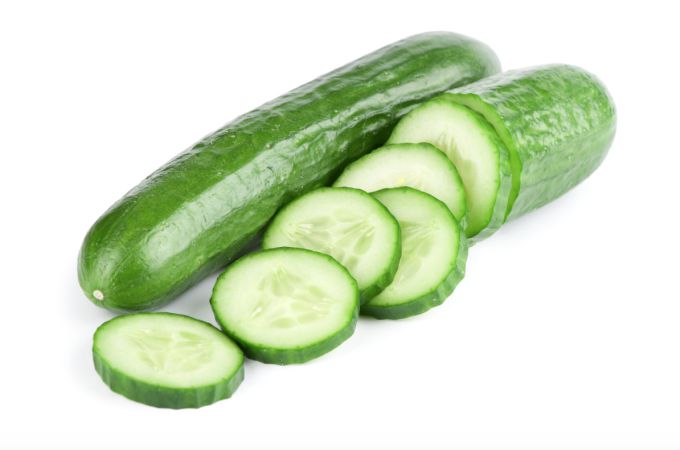Last time we talked about apples and why they are good for dogs. Now we’re going to talk about cucumbers and their benefits to your pet. The cucumber is a common vegetable that everyone uses in cooking or add-on to meals.
The cucumber may be a common vegetable, but it has various nutrients for humans. Be it pickled or sliced, can dogs eat cucumber and benefit from it?
Yes, indeed, the dog can eat cucumbers. In fact, the cucumber has the same health benefits to dogs similar to humans. If you want to know more about the cucumber health benefits on your dog, read our guide below.
What Is Cucumber?
The cucumber (or Cucumis sativus) is a commonly cultivated plant that belongs to the gourd family. The melon, pumpkin, summer squash, winter squash, and zucchini are some plants that are in the same botanical family as the cucumber.
The origin of the cucumber is in South Asia, but due to its popularity as a vegetable, it now grows in most countries and continents.
The vegetable is a creeping vine that roots in the ground. You can grow this plant upwards with supporting frames of trellises since it wraps around them as it grows.
Today the cucumber is tradable good on the global market. Cucumbers that are commercially produced are either sliced for fresh consumption or pickled that are processed into pickles. Dogs eat a cucumber to improve their health.
Nutrients Of Cucumber That Are Good For Dogs
Nutrients in foods like cucumbers contribute to the well-being and overall healthiness of your dog. So it is you need to add cucumber on your pet’s diet. Here are some of those nutrients:
- Vitamin A – A fat-soluble vitamin that helps metabolizes other nutrients for your dog’s body. This vitamin is present in small quantities, and you can lose them during the cooking process. Vitamin A in cucumbers (especially raw ones) does not suffer the same fate.
- Thiamine (Vitamin B1) – A water-soluble vitamin responsible for maintaining the usual growth process, facilitates the transmission of nerve impulse, activates acetylcholine synthesis, and metabolizes carbohydrates in your pet’s body.
- Pyridoxine (Vitamin B6) – This vitamin’s significant role in the dog’s body is to produce hormones, proteins, and neurotransmitters (chemicals that are the carrier of signals between nerve cells). Vitamin B6 also produces red blood cells to maintain the normal functions of the brain.
- Vitamin C – Another water-soluble vitamin-like Vitamin B1 that can be a benefit to your pet. This vitamin improves and enhances your dog’s immune system. Vitamin C increases the function and activity of white blood cells. The production of antibodies increases along with interferon.
- Vitamin D – A fat-soluble vitamin similar to Vitamin A. The dog’s absorption of phosphorus and calcium is crucial to its health, and Vitamin D helps with that function. Preventing rickets, bone fractures, muscle pains, and joint pains are other functions of this vitamin.
Not a nutrient per see, but water in cucumber is a big help to your dog too. Feeding your dog a cucumber to re-hydrate it is a good idea.
If your dog doesn’t drink water enough or has a water shortage, then the cucumber can help — also a great treat for the dog during hot summer days.
Cucumber Health Benefits
A dog’s diet must include food that improves and maintains its health. They are the essential reason you need to add cucumber to your pet’s diet.
Every pet owner knows of this fact since a healthy pet is a happy and well-balanced pet. Cucumbers in your dog’s meal have various nutrients that can maintain and improve your dog’s well-being. Here are a few examples of the health benefits that cucumbers give to dogs:
Improved Physical Health
Specifically, cucumber prevents your dog from the following: night blindness, poor growth development, and dull coat color. The cucumber can also stop skin problems, which can debilitate your dog. So that is why cucumbers are good for dogs with various skin problems. Some examples of skin condition in dogs are:
- Allergic Dermatitis – This is an allergic reaction to pollen, insect bites, grooming products, environmental irritants, and food.
- Yeast infection – The dog’s ears or paws are the body parts that suffer from this disease. Discolored, irritated, or itchy skin is signs of a yeast infection.
- Folliculitis – A common problem in dogs with short hair though it also affects long-haired dogs. This issue by folliculitis bacteria and causes sores, scabs, and bumps on the dog’s skin. In long-haired dogs, the bacteria can cause a dull coat, shedding, and scaly skin.
- Impetigo – Another bacterial infection through this one mostly affects puppies. The infection has the appearance of blisters that are full of pus and may break and crust over. The blisters appear in the part of the abdomen where there is no hair.
- Seborrhea – This skin problem is either a genetic disease or is a result of a complication like hormonal abnormalities or allergies. Seborrhea looks greasy and develops dandruff.
- Ringworm – No, this problem is not the result of a worm infestation, but fungi. Ringworm looks like a circular patch on the head, paws, ear, and forelegs of your dog. The infected area has scaly patches, inflammation, and loss of hair around it.
- Alopecia – Hair loss and shedding is a common occurrence in dogs, but due to stress, illness, and poor nutrition, it can become a problem. If you notice that your dog has patches of missing hair and has excessive shedding, then it has Alopecia.
Enhances The Dog’s Immune System
Vitamin C in cucumber strengthens the white blood cell’s ability to function efficiently with their tasks. Cucumber increases the blood levels of interferon, which is the body’s natural anticancer and antiviral compound.
The vitamin also enhances the number of antibodies in the dog. A healthy, functional immune system can lessen the chances of abscesses, kennel cough, respiratory infections, and other bacterial infections. A dog with a robust immune system is also likely not to get sick often.
Strengthens The Dog’s Bones
Cucumber has plenty of Vitamin D to help regulate the metabolisms of phosphorus and calcium. As a result, the calcium and phosphorus are absorbed quickly into the intestine. Also, the vitamin reduces the loss of calcium and phosphorus in urine, which in turn allows the dog to maximize the use of both elements.
Calcium itself supports the function and structure of the dog’s bone, preventing them from breaking or fracture easily.
Puppies can benefit from calcium during their growing period. Finally, the calcium prevents osteomalacia (pains in the muscle and joint) and rickets. Puppies during their growth period need lots of calcium and phosphorus from cucumbers to help strengthen their bones.
Why Are Cucumber Good For Dogs?
The cucumbers are good for dogs due to their intrinsic nutritional properties. Any dog (or pet) owners must know why certain foods are healthy for their dogs. In cannot stress enough as to why you need to add cucumber on your pet’s diet. Here are a few reasons why cucumbers are good for dogs and why they are necessary:
- Cucumber contains water. One cucumber has a high moisture content, and a few slices are more than enough to provide water. This trait of the cucumber is helpful to some dogs. Whatever the reasons, some dogs don’t drink enough water. Feeding a few sliced cucumbers should help with that problem. Some dogs have unexpected dehydration, and the cucumber can offset that situation. Lastly, cucumbers are excellent alternative summer treats for your dog. Summer days can be hot, and cucumber can cool off your pet. As a bonus, cucumbers can deal with your dog’s bad breath. Just remember not to substitute actual water with cucumber water. You’re dog still needs the real water to thrive.
- If you’re worried about your dog’s weight, the cucumbers can help with that problem. Some foods have lots of calories, while others have less of the same thing. So can dogs eat cucumber without gaining weight? They can since cucumbers happen to be one of the foods that have fewer calories. The low-calorie content of the cucumber is a boon to dogs with weight problems. Since cucumbers can be filling to your dog’s appetite without adding too much on its weight, this attribute of cucumber allows you to control your dog’s weight problem without depriving it too much. The cucumber makes for an excellent treat reward due to its low-calorie content. However, do not forget to give your dog physical exercises. Do not substitute cucumbers for activities like walking, running, and playtime. Your pet still needs to do these physical activities.
- It is a sad fact that some dog breeds have a tendency to be affected by arthritis. The usual way to deal with the arthritis problem is to have it treated by a veterinarian or take some medication. It is also a fact that the vet and medicines can eat one’s budget, especially if it is limited. It’s a good thing that cucumbers are best for dogs with arthritis. The cucumber has several nutrients to help mitigate this particular health problem. Also, the cucumber can deal with other issues related to arthritis. An arthritic dog often feels great discomfort and stiffness due to its joint, poor health. The cucumber’s silica component is useful in alleviating the pain and stiffness.
READ MORE
- CAN DOGS EAT WATERMELONS
- FRUITS THAT DOGS CAN EAT AND CANNOT EAT
- CAN DOGS EAT MANGOES?
- CAN DOGS EAT PINEAPPLES
How Many Cucumbers Can Dog Eat Daily?
Cucumbers are not toxic or harmful to your pet, but it can be a bad thing in excess. Moderate any food that you give to your dog. Too much of anything is not healthy for your dog’s health.
There is no set limit of cucumbers that you can give your pet daily. However, the most average number of cucumbers that you can give your dog is 2 to 3 small slices. You can either give the cucumbers as a treat, as a handful of pieces or an add-on to your dog’s main meal. Also, you can plan your dog’s cucumber intake.
You can choose to either give your dog a small bit once per day or give it occasionally. Whatever you do, just do it in moderation.
You should also take into account on how much food can your dog eat. Small dog breeds have little stomachs, so feeding them too much cucumber can lead to indigestion.
This situation could force the dog to vomit its meal. Another sign of overfeeding cucumbers is your dog suddenly becomes gassy and has a bout of diarrhea. If these symptoms happen, then you should cut back and moderate the cucumber feeding.
Avoid giving pickled cucumber to your dog. Pickled cucumber contains lots of vinegar and salt that could mess up your dog’s digestive system. Only fresh and raw cucumbers will suffice.
Can Puppies Eat Cucumber?
Yes, they can. Puppies are capable of eating cucumbers. However, before giving some cucumber to a puppy, make sure that it is weaned and can eat solid food. Also, provide only enough cucumber that the puppy can eat.
Puppies have small stomachs, and they can eat so much food before they get indigestion. Since cucumber is a good source of water, you can get your puppy to get used to it.
That the all the info about cucumbers and why they’re a superb choice of vegetables for your pet. Now that you know what cucumbers can do for your dog, then go ahead give some of it to your dog. It’s going to be a sure thing that your dog will love cucumbers and will be a healthy and well-balanced pet.




